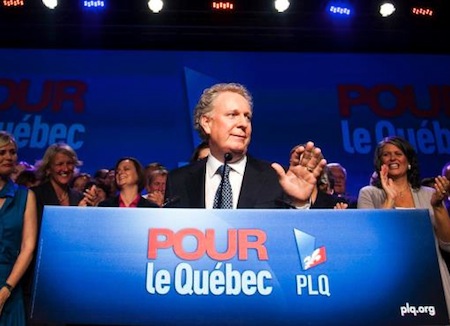Jean Charest stepped down yesterday as the leader of Québec’s Parti libéral du Québec (Liberal Party, or PLQ), following his loss in Tuesday’s election for the 125-seat Assemblée nationale.![]()
![]()
His party finished less than 0.75% behind the soveriegntist Parti québécois (PQ), and it won just 50 seats to the PQ’s 54. But those four extra seats mean that the PQ will form a minority government under Pauline Marois, bringing Charest’s nine years as premier to an end. Charest himself lost the seat that he has held since 1998 in his election district of Sherbrooke (where he also held a federal seat in the House of Commons from 1984 until leaving federal politics to take the helm of the PLQ).
The race is on to replace him, although outgoing justice minister Jean-Marc Fournier has already said he’s not running, and the remaining candidates are hardly well-known figures:
- Raymond Bachand, Charest’s finance minister since 2009, has only been a MNA since 2005 and, at age 64, may be viewed as too old for the leadership.
- Pierre Moreau, an MNA since 2003, was most recently Charest’s transportation minister.
- Sam Hamad, also an MNA since 2003, the is Syrian-born, a former minister of labour, employment and transport, and most recently minister of economic development.
- Pierre Paradis, an MNA since 1980, who clashed with Charest and never served in Charest’s cabinet, was previously a candidate in the 1983 leadership race that Robert Bourassa won.
In fact, the 1983 contest that Bourassa won was the last contested PLQ leadership race. Bourassa, who was premier of Québec from 1970 to 1976, resigned after losing the 1976 election to the PQ, only to return in 1983 to provincial politics — he would thereupon return as premier from 1985 to 1994.
After nearly three decades at the pinnacle of Canadian and Québécois politics, surely Charest deserves a break — to be a grandfather and to reclaim a bit of his own life.
But was Charest’s decision the right one politically?
His party suffered only a narrow loss — just two election districts moving from the PQ to the PLQ could have resulted in a tie. Coming so close to winning a fourth mandate, and given that nearly everyone believes the next election will come sooner rather than later, Charest could easily have found himself back as premier in a year or two.
Furthermore, the lack of firm leadership at the helm of the PLQ will make the opposition to Marois’s government less effective, just as the long, drawn-out leadership contest at the federal level for the New Democratic Party left prime minister Stephen Harper with much freer reign. To the extent that Charest and the Liberals want to take a firm stand against anything Marois wants to pass, it will be much more difficult without an effective leader throughout the coming months.
To that end, there’s no one in Québec politics with as high a profile as Jean Charest — not even Marois (not yet, at least). The only person who comes close is former Bloc québécois leader Gilles Duceppe — a one-time potential candidate for the PQ leadership.
The only explanation I can think of (other than the fact that he’s honestly ready to move on) is that he expects the Charbonneau commission to dredge up some fairly damning evidence against his government’s dealings on construction contracts — which would also explain his push for snap elections with nearly a year left in his mandate.
In any event, what’s next for Jean Charest? At age 54, he’s got plenty of time left for yet another act in political life — he could still ‘pull a Bourassa’ and return for another stint at the helm of the Liberal Party.
Also, having made the jump from the leader of the federal Progressive Conservative Party in the 1990s to provincial politics, perhaps Charest has his eyes set on another jump back to federal politics — the federal Liberal Party is electing a new leader on April 14, 2013 and, if Justin Trudeau fails to make the race, it will be incredibly wide open.
I’ve not seen anyone suggest it, but stranger things have happened in Canadian politics. After all, the federalist Charest left national politics just three years after a contentious (and nearly victorious) referendum on Québec independence, and he’ll leave office with the sovereignty question so subdued that even Marois has been hesitant to say she’ll call a referendum anytime soon. As such, he’s generated a ridiculous amount of goodwill throughout Canada (to get a sense of that goodwill, read the Globe and Mail‘s editorial from Tuesday, “All of Canada owes Jean Charest a great deal”).
